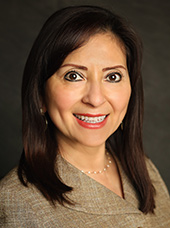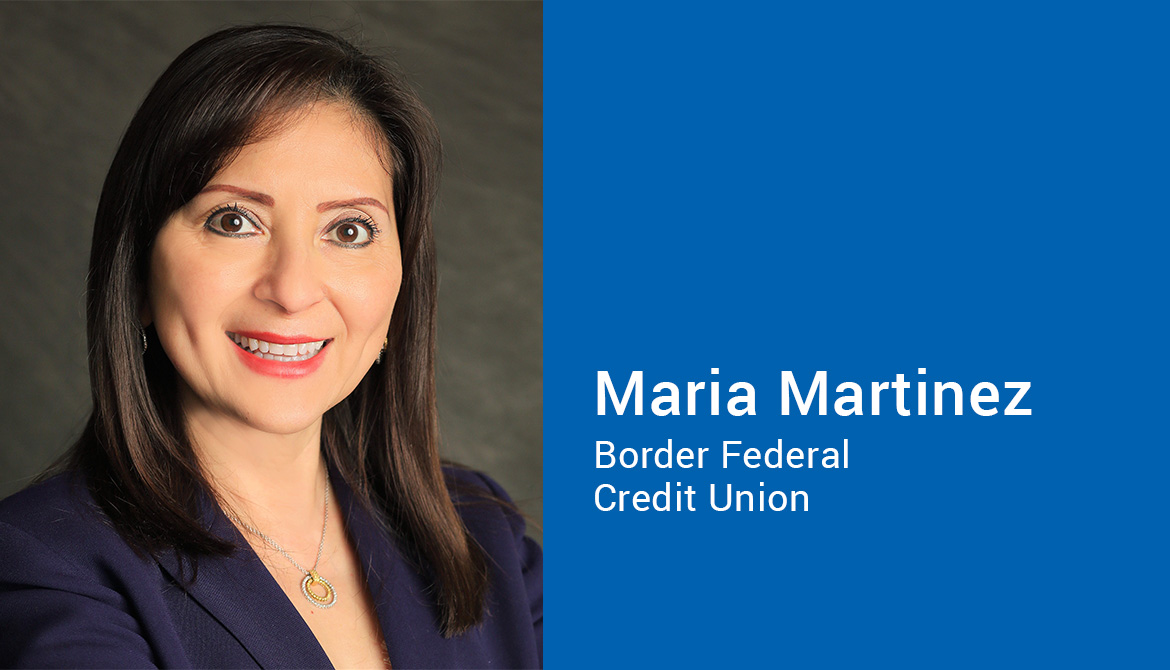6 minutes
Foresight, a clear sense of where she wanted to go and a determination to inspire confidence at every level of her career all combined to make Maria Martinez straight to the top.
Maria J. Martinez, president/CEO of Border Federal Credit Union, believes in the power of mentorship, advising women who want to rise up through the ranks while seeking guidance from mentors and others. But this doesn’t have to be a formal arrangement. Instead, keeping eyes, ears and mind open will serve quite nicely.
“My mentors have been people I’m surrounded by,” explains Martinez, a CUES member. “I never asked someone to be my mentor, nor did anyone ever come to me saying they wanted to be my mentor. I simply consider my mentors those who share with me their wisdom, guidance, knowledge and experiences. I even consider a mentor someone who corrects or disciplines me, because this challenges me to be better at my job or as a person.”
Martinez landed at Border FCU nearly 29 years ago. It wasn’t her first foray into this industry; she arrived at Border from another credit union where she was first hired as an accounting manager. She had been working in banking at the time, but after a few years with that credit union, she fell hard for the industry’s philosophy of “people helping people.”

“Besides my accounting duties, I started getting involved in fundraising and community projects,” she recalls. “It was then that I knew I had found my calling for wanting to improve people’s financial lives and for serving the underserved.”
Martinez left that organization in 1994 (where by then she had been promoted to comptroller), and moved on to Border FCU, assuming the position of VP/lending and then swiftly stepping into her current role, which she has occupied for 26 years.
With assets of $235 million and headquartered in Del Rio, Texas, Border FCU has a total of five service locations throughout Texas, and currently serves 26,772 members. Martinez oversees a staff of 100 full-time and seven part-time employees. Advancing Women asked Martinez to share some of the leadership challenges she has faced (try stepping into the shoes of a very well-liked department VP), her take on the important role trust plays and how women can move their careers forward.
What have been some of the most impactful decisions you’ve made that have led you to your current position?
“In 1994 when I interviewed for the vice president of lending position here at Border FCU, the former CEO mentioned he was planning on retiring within the next three years. All I could think of after I got hired was that I needed to prepare myself to take his job, and that this could only be done by learning as much as I could about our operations and building trust to make me the best candidate for the job when the opportunity would present itself.
“When I became VP/lending, there was some resistance from the staff, since I was taking over a position that had been held for many years by someone whom the staff really liked. I came in with a very positive attitude. As I was recommending and making changes, I was also involving my team and empowering each person with responsibilities, where they took ownership of their tasks without me micromanaging them—I’ve never been the micromanaging type of person. My team responded favorably to my management style, allowing us to increase production.”
Was winning over the staff your biggest leadership challenge to date?
“My biggest challenge in leadership has been building a cohesive team and keeping the team motivated. I found that by being a good role model and building trust our team worked well together, achieving our objectives while also celebrating our successes and learning from our mistakes. Our team may not be perfect, and at times we may have our differences, but when it comes to getting the job done or accomplishing a project, we always work together to obtain the best result.
If you had to pick just one skill critical for leadership, what would it be?
“It has to be trust. Your team is not going to support or follow you unless they feel they can count on you to be there for them when they need you or they’re confident that you’ll go to battle for them when in crisis.”
How does one go about building trust?
“One’s actions, transparency and humbleness are what builds trust, no matter where you are in your career. For instance, when I started my career in banking, I had to build my knowledge of the job and act with integrity so that my coworkers and supervisors could trust me. As I advanced in my career, I started getting involved in more than just knowing and doing my job, in working in teams and organizing functions that brought people together or that benefited others who needed a service or financial assistance."
“As I did this, I put into practice what I learned at home—to treat others with respect and courtesy and to show empathy. I learned the more active I stayed and the more I served on boards and committees, my knowledge grew, my network of resources expanded and people looked to me for advice.”
How did becoming president and CEO impact the need to build trust?
“[It] escalates the urgency at all levels. You are now in charge and must stay in control of every situation because too many people are depending on you, and the success of the credit union is now in your hands.
“As the first woman CEO at Border FCU, I knew I had to prove myself as a leader. I made sure I demonstrated competency by staying on top of current issues, laws and regulations related to our industry. I also made sure to consistently follow through on my promises and commitments. I like to be transparent at all times. I figured the more my staff knew about what was going on at the credit union, the more resourceful they would be.
“My staff liked to have fun at work too, so we started hosting community events and eventually developed programs to serve the underserved and unbanked. We mix fun with education, and this has proven to be a great tool where we’ve earned the trust of residents in the communities we serve.”
What is your advice for those women who want to hone their skills and advance their careers?
“Set achievable goals and do everything in your power to reach those goals. When I started working in banking, I wrote down that I wanted to be a bank CEO. Well, I definitely think I did better; I’m a credit union CEO.
“[Also] build a positive professional image to stand out to potential opportunities for career advancement. And lastly, seek guidance from mentors, peers, chat groups and online resources to make informed decisions.”
How can credit unions and industry organizations best support women in their efforts to succeed in this arena?
“The industry should embrace gender equity as part of its culture. We need to be intentional in correcting inequities in our hiring and promotion processes. Regardless of gender, everyone should have access to the same opportunities for career advancement and equal pay. And, most important, our industry should advocate and empower women to take on leadership roles. I consider myself very fortunate for having had people in my life that have valued my skills and knowledge and trusted me for the leadership positions I’ve held throughout my career. Yes, we must work hard and prove ourselves, but without the trust and support from others, it would be hard to succeed.” cues icon
Pamela Mills-Senn is a writer based in Long Beach, California.





